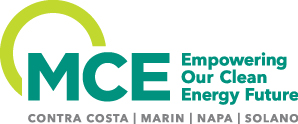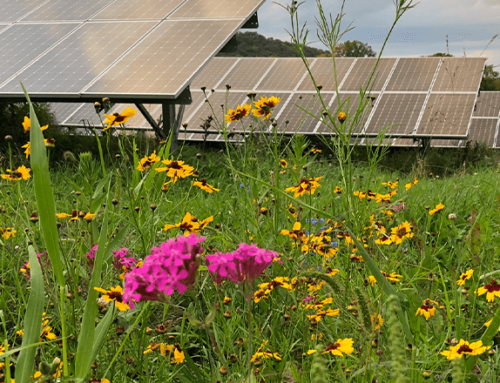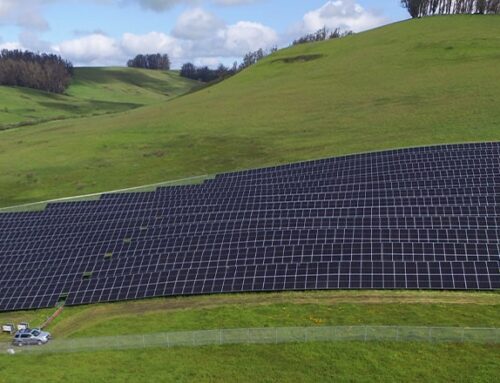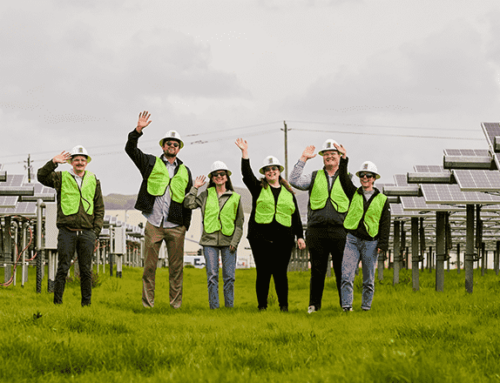The MCE Cares series focuses on the impacts of climate change, climate action strategies, and the ways you can make a difference. The climate is in our hands. What action will you take? Learn more at mceCares.org.
Energy efficiency is a simple way to reduce your carbon footprint without making changes to your daily routine. Around 73% of global emissions come from using energy in buildings, industry, and transportation. Using energy more efficiently is a powerful strategy to lower these emissions across all sectors.
What are the benefits of energy efficiency?
This section covers the environmental, health and safety, power grid, and economic benefits of energy efficiency.
Environmental Benefits
Increased energy efficiency provides many environmental benefits. Using less energy helps reduce emissions and pollution from extracting and burning fossil fuels. The result is cleaner air, cleaner water, and protection of our natural environment from the impacts of climate change.
Health and Safety Benefits
Energy efficiency means burning less fossil fuels at home and in power plants. These reductions hold powerful benefits for reducing air pollution. A study from the American Council for an Energy-Efficient Economy found that reducing U.S. energy consumption by 15% for a single year would save more than six lives each day and $20 billion in avoided health harms, and it would lead to 30,000 fewer asthma episodes.
Power Grid Benefits
Energy efficiency can help strengthen our electric grid by reducing system peak demands and stabilizing the cost of electricity. Energy efficiency also helps speed up the transition to renewable energy. With less energy demand, we can draw a higher percentage of our energy from existing renewable sources and rely less on polluting fossil fuel plants.
Economic Benefits
Implementing energy efficiency can help grow the local job force and economy. The clean energy economy currently employs over 3 million people in the United States. Two-thirds of clean energy jobs are at small businesses with less than 20 employees. Clean energy jobs also offer higher wages than the national average and are widely available for workers without a college degree. In addition, energy efficiency can help residents and businesses save money on their own electric bill. The average household can save up to 25% on their utility bills with energy efficiency measures.
How can you become more energy efficient?
Here’s how you can implement energy efficiency to save money and combat climate change.
Home Upgrades
- Replace incandescent and CFL light bulbs with LED bulbs, which use up to 70-90% less energy.
- Upgrade appliances that are 15 years old or older to energy efficient electric models. When evaluating your choices, look for ENERGY STAR® certified models.
- Switch to heat pump heaters, which offer increased energy efficiency and reduced air pollution and carbon emissions.
- Switch to electric and induction cooktops, which produce less ambient heat that requires less energy spent on air-conditioning.
- Install more insulation and seal your doors, windows, and air ducts to keep your home temperature controlled.
Habits
- Unplug vampire appliances, which drain energy even when they’re not being used. Take advantage of power strips with an on/off switch to control the energy usage of multiple devices at once.
- Turn off the lights when you leave a room and turn off your air-conditioning or heater when you leave home.
- Use fans instead of air-conditioning. Alternatively, run your air conditioner at a higher temperature paired with a fan to maintain the same level of comfort. Fans use only a fraction of the energy of air conditioners.
- Replace your air filters regularly. Clogged filters cause your heating or cooling system to work harder and waste energy.
Transportation
- Switch to an electric vehicle, which is three to four times more efficient than standard gasoline vehicles.
- If you purchase a gasoline vehicle, compare models to find a car with an efficient fuel economy that saves money on gas and reduces pollution.
- Drive efficiently by avoiding excessive braking and accelerating. Efficient driving can improve your gas mileage by 10% to 40%.
- Join a carpool or take public transportation.
How does MCE support energy efficiency?
In support of MCE’s mission to reduce energy-related greenhouse gas emissions, we offer a variety of energy efficiency programs to help our customers reduce their electricity bills, improve the comfort of their homes, and decrease their carbon footprint. MCE is committed to lowering barriers to energy efficiency for vulnerable and income-qualified communities and ensuring that upgrades are available to populations who need them most.
Residential Energy Efficiency
MCE’s Home Energy Savings Program provides qualifying single-family homeowners and renters with free home energy upgrades, free energy-saving gift box, and virtual home energy assessment. Energy efficiency upgrades include installation of heat pumps, water heaters, attic insulation, gas furnaces, duct sealing, pipe insulation, and tips to improve the health and safety of your home. MCE also offers rebates to decrease the cost of installing heat pump water and space heaters for homeowners.
Multifamily property owners and renters can also receive rebates for energy efficiency measures through MCE’s Multifamily Energy Savings and Low Income Families & Tenants (LIFT) Programs. A recent study of MCE’s LIFT Program showed that the 680 participating households saved over $192 per year on their electric bills by installing high-efficiency electric heat pumps and energy efficiency upgrades.
Commercial Energy Efficiency
MCE’s commercial energy efficiency program helps commercial properties in MCE’s service area lower their energy bills, reduce maintenance costs, and improve productivity. Eligible energy efficiency projects cover a range of technologies, including LED lighting, heating, ventilation and air-conditioning (HVAC), refrigeration, and controls.
Agricultural and Industrial Energy Efficiency
MCE’s Agricultural and Industrial Resource (AIR) Program helps local agricultural and industrial customers reduce energy consumption and costs while supporting core business objectives. The program’s rebate funding and technical support covers refrigeration, lighting, water heating, motor upgrades, water conservation, and custom-calculated incentives for more complex projects, including savings measured at the meter.
Workforce Education and Training
MCE and BayREN are offering a $1,000 incentive paid directly to licensed contractors who help replace customers’ natural gas or propane residential water heaters with high-efficiency heat pump water heaters. MCE also offers online energy efficiency training through our Energy Efficiency Electrification Workshop Series.






